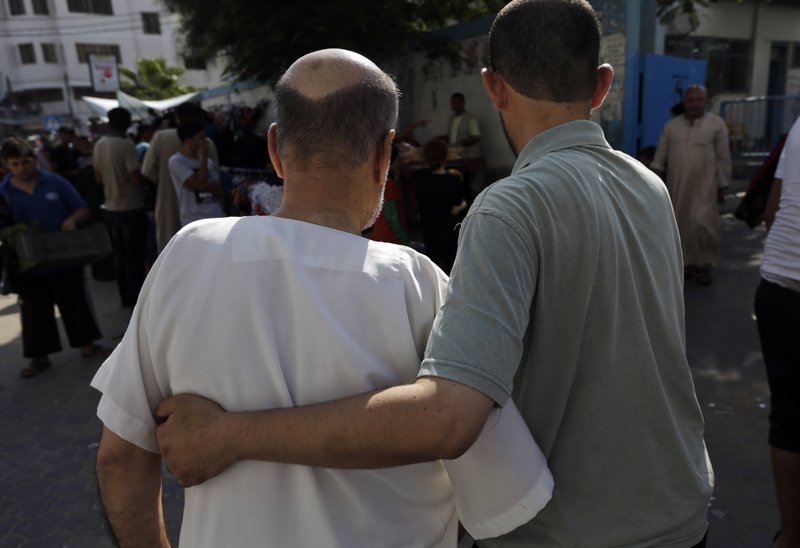CAIRO -- Indirect Israeli-Palestinian negotiations over extending a cease-fire in the Gaza Strip and ending a blockade of the battered territory got underway Wednesday in Cairo, with both sides taking hard-line positions.
Israel wants the Islamic militant group Hamas to disarm, or to at least ensure it can't re-arm, before considering the group's demand that the territory's borders be opened. Israel and Egypt imposed a blockade after the Hamas takeover of Gaza in 2007, although Egypt allows people to cross intermittently.
"The two sides have reviewed what they consider issues of concern," Egyptian Foreign Minister Sameh Shukri said at a news conference, describing the matter as "complicated and not easy."
Hazem Abu Shanab, a member of Fatah, one of the main factions involved in the talks, said disarmament would require Israel to pull out of occupied Palestinian territory.
"As long as there is occupation, there will be resistance and there will be weapons," he said. "The armament is linked to the occupation."
Meanwhile, in Jerusalem, Israeli Prime Minister Benjamin Netanyahu defended Israel's bombardment of Gaza, saying that despite the high civilian death toll, it was a "justified" and "proportionate" response to Hamas attacks.
"Our enemy is Hamas, our enemies are the other terrorist organizations trying to kill our people, and we have taken extraordinary measures to avoid civilian casualties," he said.
Nearly 1,900 Palestinians have been killed in the fighting, about 75 percent of them civilians, according to the United Nations. Israel said about 900 Palestinian militants are among the dead. Sixty-four Israeli soldiers and three civilians inside Israel also have been killed.
The Palestinian delegation in Cairo is composed of negotiators from all major factions, including Hamas, and is meeting with Egypt's intelligence chief for briefings on Israel's demands.
"The most important thing to us is removing the blockade and starting to reconstruct Gaza," said Bassam Salhi, a Palestinian delegate. "There can be no deal without that."
He said the cease-fire, set to expire at 8 a.m. Friday, would likely be extended if more time for talks is needed.
There has been no official Israeli response, though an official at Netanyahu's office said Israel has "no problem" with "unconditional extensions of the cease-fire." He, like the Egyptian security official, spoke on condition of anonymity because he was not authorized to speak to the media.
While negotiations are still in the early stages, the outlines of a possible solution have emerged, including an internationally funded reconstruction of Gaza overseen by a Palestinian unity government led by President Mahmoud Abbas. The Western-backed Abbas lost control of Gaza in the Hamas takeover of 2007.
Regarding an easing of the blockade, a statement by the Egyptian intelligence agency indicated Egypt would not agree to major changes at the Rafah crossing between Egypt and Gaza and that the onus of lifting the border closure would fall on Israel.
Cairo also refuses to open its border fully as long as Hamas, not the Palestinian Authority led by Abbas, controls the Gaza side of the terminal.
Rafah is closed to commercial traffic, and only individuals are permitted to cross. But Egypt has sharply restricted travel rights of Gaza residents in the past year and waiting lists have grown.
On Wednesday, United Nations Secretary-General Ban Ki-moon demanded an end to the suffering in Gaza, telling the General Assembly that "the massive deaths and destruction in Gaza have shocked and shamed the world."
Ban urged the international community to support the enormous task of rebuilding Gaza, providing humanitarian aid to thousands in need and treating the wounded.
"We will build again, but this must be the last time to rebuild," the U.N. chief told the 193-member world body. "This must stop now."
The U.N.'s deputy humanitarian chief, Kyung-wha Kang, said the United Nations and its partners have appealed for $367 million to address immediate needs for more than 500,000 people who "fled for their lives with nothing."
The current confrontation began with the June 12 abduction and killing of three Israeli teens in the West Bank, which Israel blamed on Hamas before rounding up of hundreds of its activists. Militants responded with barrages of Gaza rocket fire into Israel.
Israel's Justice Ministry announced Wednesday the arrest last month of Hussam al-Qawasmi, the suspected mastermind behind the killings of the Israeli teens.
He reportedly led a three-man cell affiliated with Hamas. The militant group has not claimed any connection to the teens' abduction and killings.
Information for this article was contributed by Karin Laub, Ibrahim Barzak, Mohammed Daraghmeh, Peter Enav, Joe Federman, Ian Deitch and Edith M. Lederer of The Associated Press.
A Section on 08/07/2014


